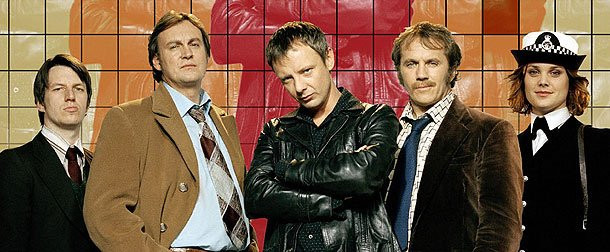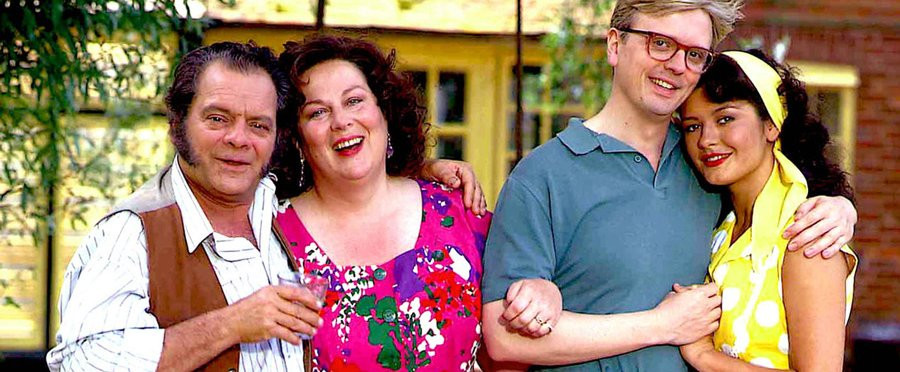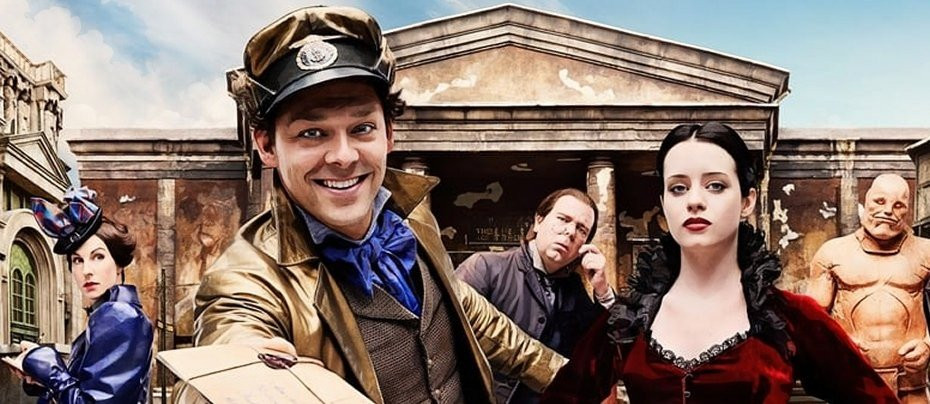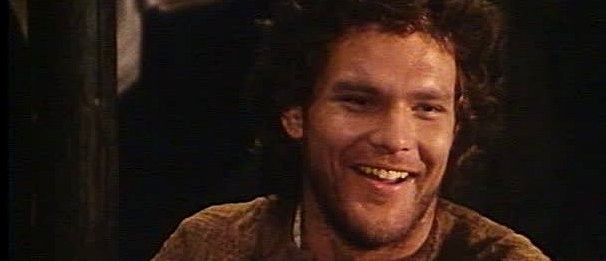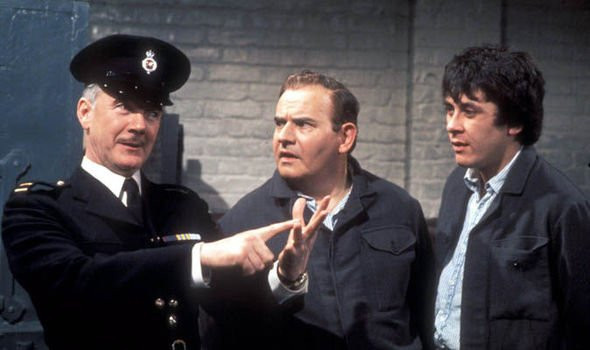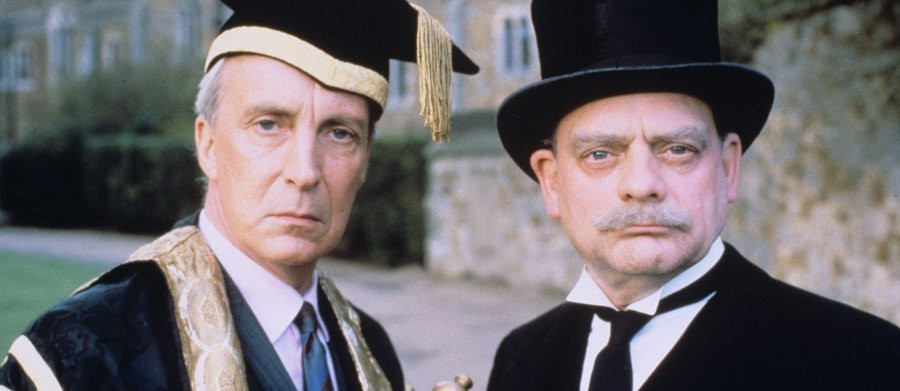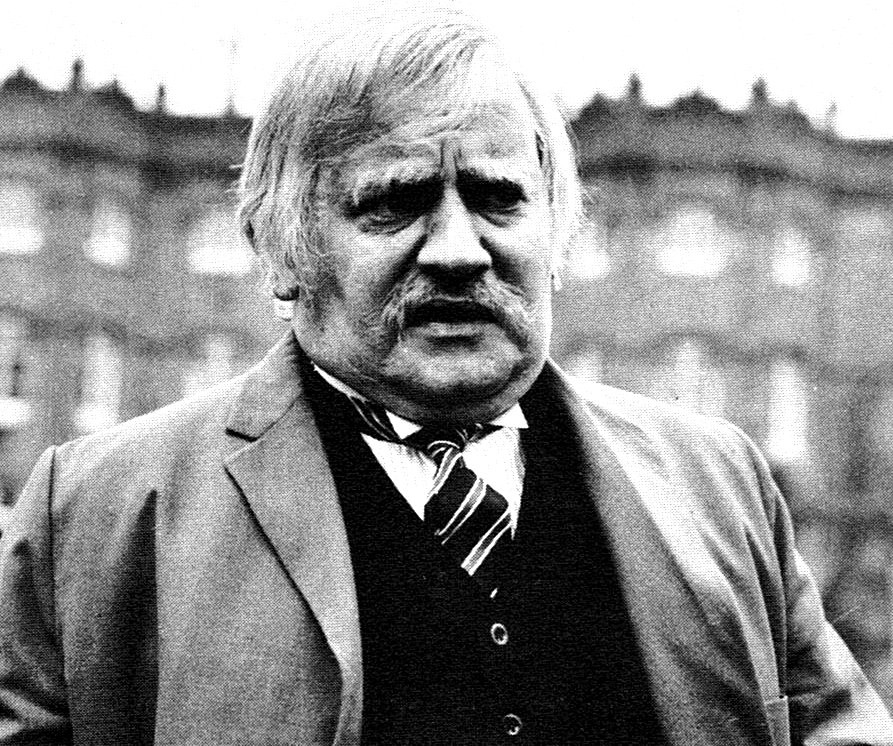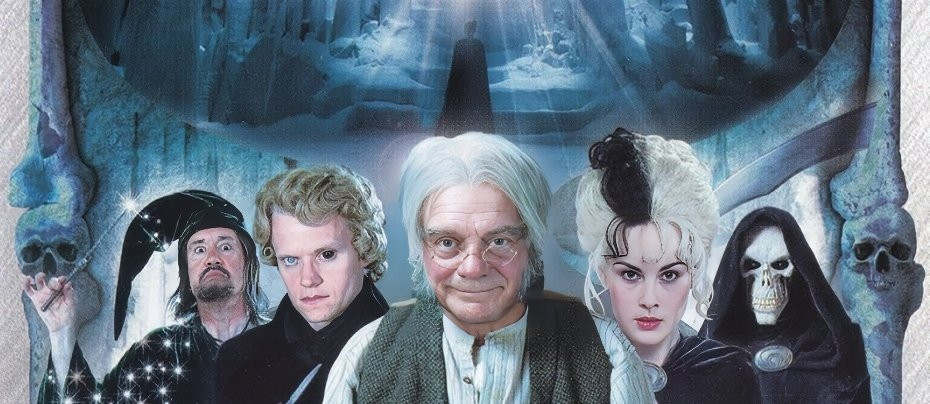
Terry Pratchett's Hogfather
2006 - United KingdomReview by Daniel Tessier
Terry Pratchett's Discworld novels form one of the most popular, most celebrated and most influential series of modern fantasy literature. The forty-one novels, published from 1983 to 2015, have been translated into over thirty languages and sold worldwide, and made the late Pratchett the best-selling author in Britain during the 1990s. Yet it wasn't until well into the 21st century that a live action adaptation of a Discworld novel was put into production.
This isn't, in fact, all that surprising. Pratchett's prose is infused with his unmistakable voice and idiosyncratic humour, with complex, intelligent plots full of bizarre, magical imagery that would be challenging to commit to screen. In the early days of the series, as it began to make its mark as the new big thing in British literature, several attempts were made to secure the rights and adapt the stories for television or cinema, and most of them tragically missed the point. Pratchett himself was fond of telling the anecdote of an American production company that wanted to adapt the fourth novel, Mort, the tale of the Grim Reaper's apprentice. The execs told him to “lose the Death angle.” While surely not every studio was run by complete idiots, it does illustrate just how difficult it was the find someone who could do Discworld justice on screen.
Fortunately, producer Rod Brown (Dream Team) and writer-director Vadim Jean (Henry IX, Porters) of The Mob Film Company understood Discworld very well indeed. They also understood how to sell to a TV studio and went to Sky to pitch a TV adaptation of Hogfather, the twentieth novel in the series, as a big event for Christmas – always the most important time of year for television. The eponymous Hogfather is the Discworld's equivalent of Father Christmas, bringing presents to lucky children across the Disc every Hogswatchnight, in a sleigh drawn by his four loyal giant pigs. What would happen, though, if someone took out a contract on the Hogfather, for their own obscure and nefarious reasons? Who could step in to take up the role and save Chris- , I mean, Hogswatch?
Sky was receptive, but Brown and Jean hadn't actually got the rights from Pratchett. Having fought off clueless American studios for years, the writer was reluctant to sign over the rights to his works, but after a three-hour meeting he was convinced that the creatives had actually read the book, respected it, and most importantly, understood what needed to be cut and what needed to be retained in order to make it work on screen. Sky approached Hallmark to share the financing in return for international distribution, with production rights going exclusively to The Mob.
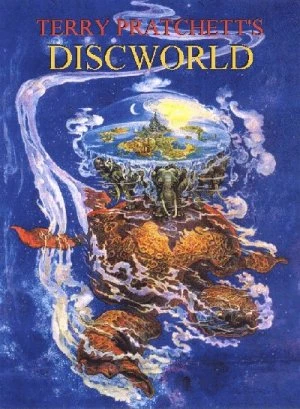
Creating the Discworld, the strangely flat planet that rides on the back of a cosmic turtle (via four pachyderm middlemen), would require both money and ingenuity. The only previous full length attempts to adapt Discworld novels – Wyrd Sisters and Soul Music, specifically – had been lengthy animations by Cosgrove Hall. Doing it in live action, and at a comparatively brief three hours, was another matter. Stephen Briggs, who had adapted the novels for stage and had also done the seemingly impossible and mapped the Disc, was brought on to storyboard the production. Writer and sculptor Bernard Pearson translated his popular Clare Craft models of Discworld locations to the screen, devising a distinct look to the great and grubby city of Ankh-Morpork and other, even stranger locales. Jean insisted on keeping CGI to a minimum, and utilising practical effects wherever possible. Hogfather was also the very first UK drama to be filmed in High Definition; par for the course these days, but groundbreaking then, making it all the more important that the production looked as realistic and detailed as possible.
Every Discworld fan has a different favourite character, but perhaps the most popular is Death. The classic skeleton in a robe as black as night, carrying a scythe sharp enough to cut moonlight, Death would be a terrifying spectre if he wasn't so loveable. After untold millennia as the Discworld's psychopomp, Death has developed a soft spot for humanity and decides to step in when the Hogfather is suddenly missing in action. Death certainly looks as imposing as he should, yet his expressionless skull somehow communicates remarkable emotion, thanks to the subtle movements of man-in-the-suit Marnix van den Broeke, and the vocal talents of Ian Richardson (House of Cards; Tinker, Tailor, Soldier, Spy) in one of his final roles. Death

in the books and Richardson's deep tones capture this beautifully.
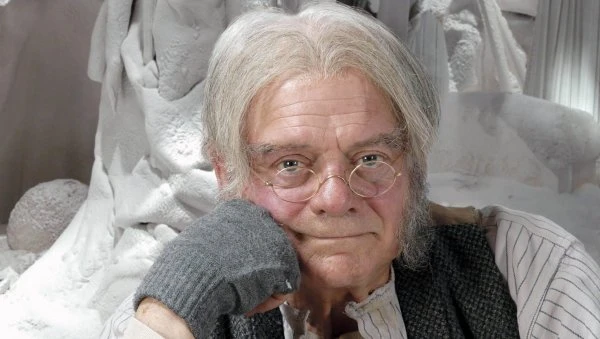
The first actor to be cast, though, was David Jason, who Brown and Jean had learned was a huge Discworld fan. Jason was not only keen to be involved in an adaptation of his favourite series, but also to get back to his comedy roots, having spent years leading the gritty crime drama A Touch of Frost. Jason's interest added a legitimacy to the project which may well have convinced the various parties to back it. Jason plays Albert, Death's grotty manservant, bringing the comedy skills he displayed in Only Fools and Horses and Open All Hours along with an almost tangible greasiness.
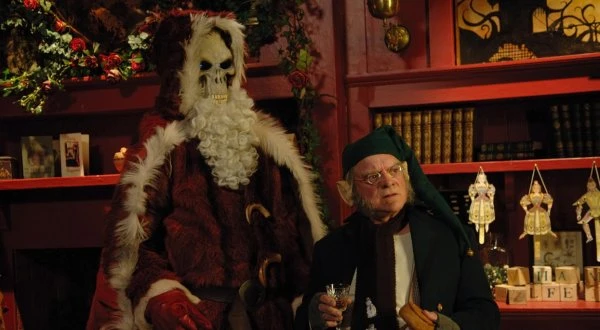
The image of the Grim Reaper in a Santa outfit is striking enough, but it doesn't compare to an elderly David Jason rolling a fag while dressed as an elf, complete with unconvincing false ears.
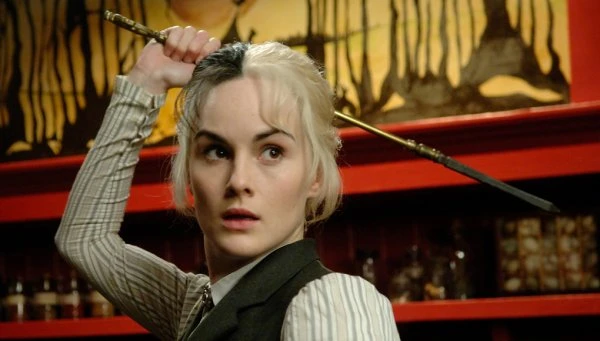
While Death is filling in for the Hogfather, the task of saving him and Hogswatch itself is down to his granddaughter (it's complicated). Susan Sto Helit was introduced in Soul Music, and has inherited some of Death's more unusual attributes. Now working as the gothic but no-nonsense governess of two small children of a well-to-do Morporkian family, Susan has a foolproof way to deal with night terrors and monsters-under-the-bed: she beats them up with an iron poker. Michelle Dockery (Downton Abbey, The Hollow Crown) is perfectly cast as Susan, unambiguously selling that she is 100% done with this sort of nonsense.
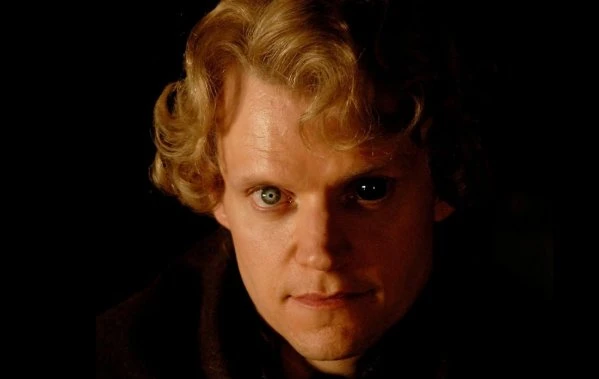
Tasked with the elimination of the Hogfather is one Jonathan Teatime (pronounced Te-ah-tem-eh), a young man so unsettling that even the rest of the Assassins Guild finds him unpleasant to be around. The mercurial Marc Warren (Band of Brothers, Hustle, The Musketeers) dons blond curls, a false eye and a high-pitched Truman Capote-like voice to play the villain. Completing the main cast is the prolific Joss Ackland (The Crezz, It Couldn't Happen Here, Mad Dogs and Englishmen) as Mustrum Ridcully, Archchancellor of Unseen University, official leader of all the wizards of the Disc. Ridcully and the rest of the University's Faculty are largely kept to their own sideplot, dealing with a dangerous bathroom and the sudden influx of unlikely entities created by the surplus of belief left by the Hogfather's absence.
One such result of this belief excess is Bilious, the “Oh God” of Hangovers, played by Welsh actor Rhodri Meilir (My Family, In My Skin) who materialises in the midst of the adventure and tags along with Susan. Sinead Matthews (He Knew He Was Right, The Smoke) plays Violet, a down-on-her-luck tooth fairy who is used by Teatime as part of his plot, with the help of thugs-for-hire Medium Dave (Peter Guinness – Smokescreen, Spender) and Banjo (Stephen Marcus – Cavegirl, Starhunter). A number of notable actors appear in small roles. David Warner (too many credits to note) is Lord Downey, the Head of the Assassins Guild; Arthur White (London's Burning) has a brief role as Ernie, driver of a milk-tooth cart (he also happens to be David Jason's elder brother).
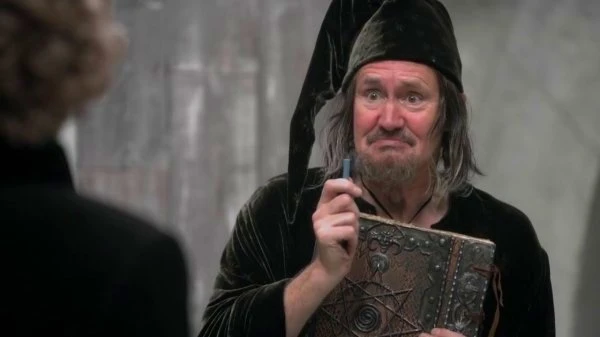
Both Nigel Planer (The Young Ones, Bottom) and Tony Robinson (Blackadder, Maid Marian and Her Merry Men) appear in small roles, having already established their Discworld credentials as narrators of the audiobooks (Planer narrated most of the first twenty-five unabridged readings, while Robinson covered the abridged versions). Many of the cast double up with additional voice roles, with Richardson providing opening narration, and Michelle Dockery performing the squeaks of the Death of Rats – credited as “Dorcky Hellmice.” Of course, Pratchett, having the run of the set and receiving the additional credit “Mucked about by,” has a cameo as well. This would become something of a tradition in later productions.
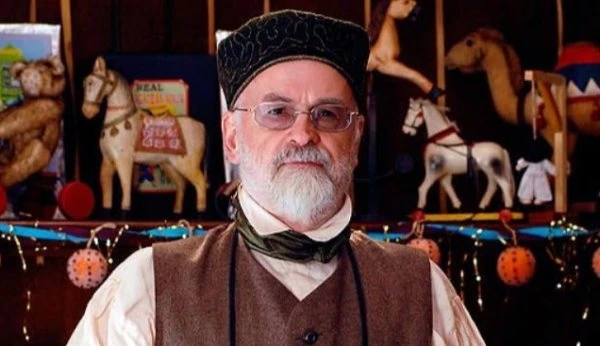
As an adaptation, Terry Pratchett's Hogfather is remarkably faithful to the original text, sensibly omitting some elements while expanding others to provide clarity that would otherwise be missing without the written word. Inevitably, anyone who loves the book will be disappointed by something that's been left out (where's the Cheerful Fairy?) but streamlining even a fairly compact novel into three hours requires sacrifices. The look and feel of Ankh-Morpork and the Discworld are beautifully recreated, and Pratchett's humour makes it through largely intact. However, the pacing is uneven, the climax doesn't strike as well on screen as it does on the page, and even compressed, the production feels overlong. It is perhaps a better adaptation of the novel than a successful television production in its own right. However, it was enough of a hit for Sky One when broadcast before Christmas 2006 that it was rerun on Christmas Eve and Day the following year, and would lead to two more miniseries, beginning with The Colour of Magic as the Easter 2008 centrepiece.
Seen this show? How do you rate it?
Seen this show? How do you rate it?
Published on December 19th, 2024. Written by Daniel Tessier for Television Heaven.


